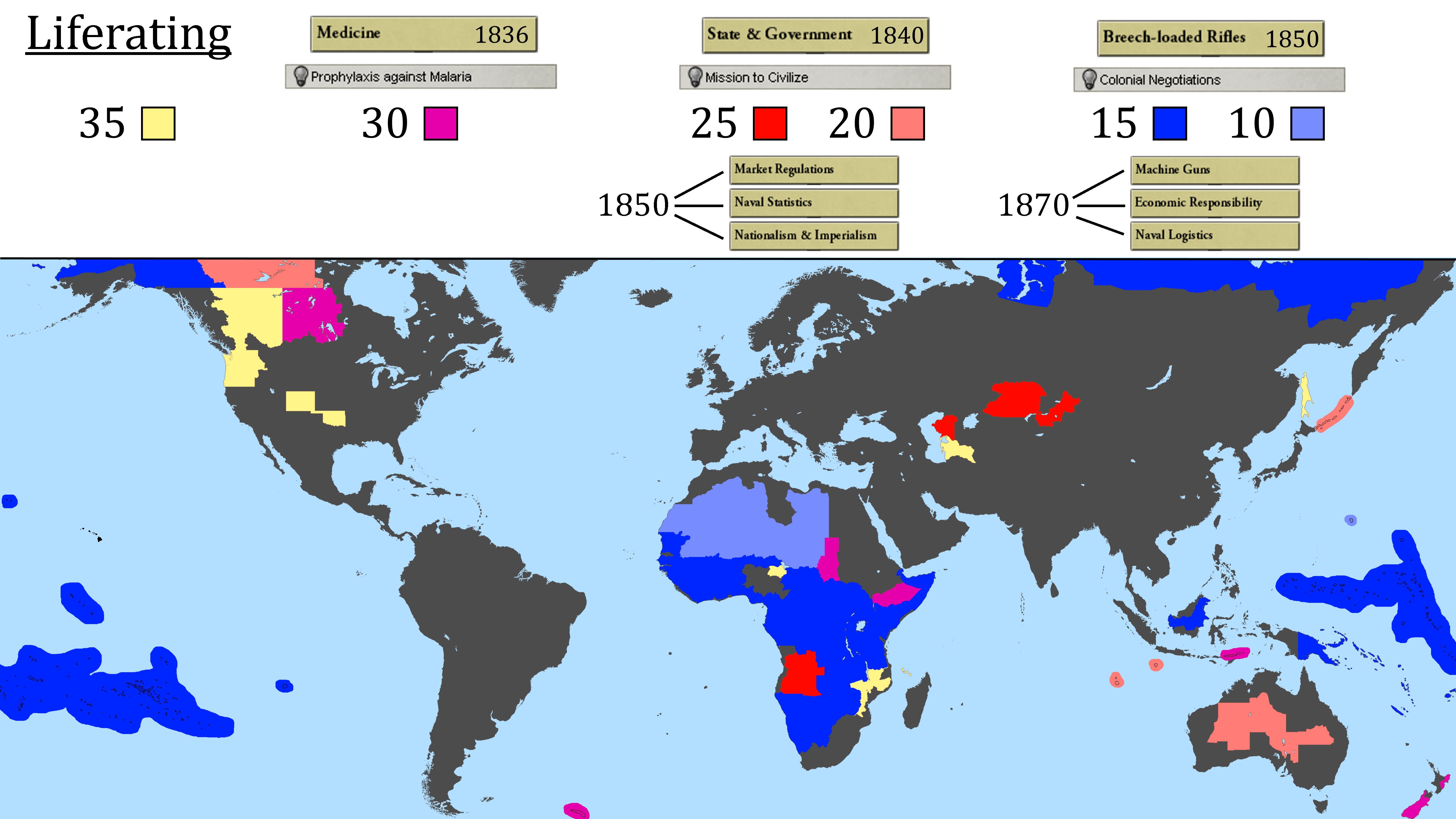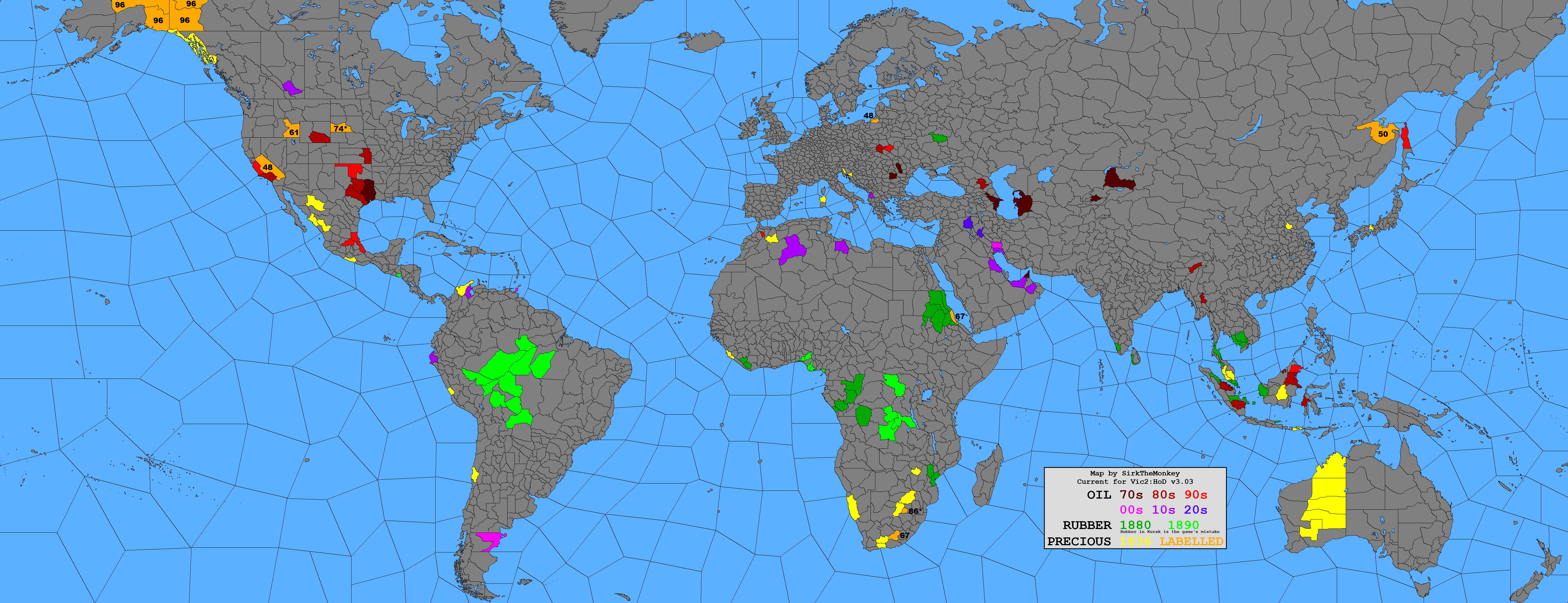Victoria 2 in laymans terms: Colonization

It is strongly recommended you play the in-game tutorial before you read this guide, as it will familarize you with the very basics like the HUD, the world map and mapmodes.
Introduction
Assuming that you understand the basics of Victoria 2 which were outlined in the previous guide, you will probably be wondering what's next. As usual, its entirely up to you how you play, but the best way of expanding peacefully is through colonization. Colonization is essential if you want to compete with the great powers, as colonization favours both blobbing and playing tall. By the end of this guide, you will understand the benefits of colonization and you will learn how to get your foot in the door before everyone else. With that said, let's get down to business.
The benefits of colonialism
Aside from making more of the world map into your colour, colonialism has a lot of positive effects for your country. For one, its the quickest way to gain prestige, allowing you to peacefully climb the ranks into a great power. And most of importantly, it gives you access to resources you otherwise could not have. Assuming you are a European power, the continent is tiny and there is no room for expansion without pissing off the bigger nations. Another important benefit is more POPs. Many European countries have small populations, which makes raising huge armies impossible. Colonizing populated areas not only gives you a huge boost in recruitable soldiers, but it also increases the output of whatever RGO is in the province.
Colonization is also strategically important, as it allows you to have more naval bases, which means more naval power, which in turn means more ships and increased colonial range (more on this later). Colonizing small islands, espeically in the Pacific, is especially useful if you plan on getting more involved in Asia, as the islands can be used as a staging ground for invasions, and for stationing your fleets.
Whilst not directly colonialism, sphering Egypt and building the Suez Canal can give you a huge advantage in the region, since it lets you sail right through the canal as opposed to sailing around the cape of good hope, saving you weeks if not months of time. As well as that, nations you are at war with cannot use the canal unless they occupy Suez, so it puts you at a huge advantage when fighting global wars. If you do build the canal, Suez will be annexed by you and treated as a colonial province, meaning you the benefits of the RGO, without having its citizens included in elections. Having a naval base here will also be useful for establishing dominance in the Mediterranean. You can also build the Panama canal which functions the same as the Suez Canal.
Drawbacks
Colonization is the aim of the game, but it does come with some new problems. Great and secondary powers can fight each other for their colonies, and during a colonial race, if it is not settled, a crisis (more on this later) can emerge and could potentially plunge the world into total war. You can of course choose to remain un-involved in any crisis, but if you've got allies involved in said crisis, they will call you to join and if you do not, relations will drop and you will get a big prestige hit. The initial colonization rush in the 1870s-1890s will more often than not decide who will remain a great power, and who will fade into obscurity. So really, the only major drawback is NOT taking part.
Colonies can rebel if their needs are not met, and if the rebellions are large enough, they can break away from your empire and declare independence, opening themselves to other great powers. It is not hard to stop colony rebellions, however the AI seems to struggle with these, and you will most likely see huge colonial empires in complete revolt throughout the game.
Strategy
First and foremost, your ability to colonize is dictated by 3 things: colonial power, minimum life rating and naval bases. Let's break each of these down.
Colonial Power
Colonial power represents your nations ability to supply, maintain and establish colonies in distant lands. Colonial power is spent on colonial races and turning protectorates into colonies. Colonial power is earned from building naval bases in core provinces, and any additional levels to those bases. So for example, constructing a navy base gives +30 colonial power, and each time it is upgraded, it gets an additional 20 points. After building naval bases, you can get more colonial power by building ships. For maximum efficency, you should focus on contructing Monitors. Ironclads yield more power however, they are alot more expensive to build and can only be built on non-overseas naval bases, so small countries like Portugal or Denmark should focus on Monitors instead.
Each time you establish a colony, a little bit of colonial power is "tied up in colonial maintenence", which essentially means you lose a bit of power, depending on how far the colony is from your nation. Colonial power can be regained by releasing colonies as Dominions, which work the same way as satellite states. Alternatively, you can just build more naval bases. As soon as you aquire a colony, it is a good idea to build a naval base there as it will increase your range even further, allowing you to colonize alot more land.
Minimum Life Rating
This represents the minimum living standards your subjects are willing to live under. All nations start with a minimum life rating of 35, and most colonial regions have a life rating of 15. Life rating can be decreased by researching the follow technologies:
- Prophylaxis against Malaria, from Medicine (Industry / Chemistry and Electricity)
- Mission to Civilize, from State & Government (Culture / Political Thought)
- Colonial Negotiations, from Breech-Loaded Rifles (Army / Light Armament)
Inventions (italics) are required to actually lower the life rating, and you don't get them overnight. Sometimes it can take years for an invention to occur, but without getting technical, if one nation invents it, its neighbors will be much more likely to invent it quicker. That is the reason the colonization rush happens between 1870 and 1890, because by then, most great powers/secondary powers end up unlocking these inventions around the same time as eachother.
Some colonial regions can be colonized in 1836, however these are few and far between, and usually only one or two nations are in a position to do so. Those regions are in the Americas, where Mexico and the US fight over them, and the others are in Australia and New Zealand, with the UK being the only power remotely close enough to colonize them. Others include Sakhalin, which only Russia can colonize due to Japan not being westernized at the beginning, South West Africa which only Portugal has immediate access to and a handful of other minor provinces in Africa. Turkmenia is not colonizable by any power initially, however Russia usually gobbles it up by conquering Khivan Uzbekistan, which would then give Russia a shared border with Turkmenia.

Naval Bases
Naval bases go hand in hand with colonial power. More naval bases=more colonial power. They are expensive to build and upgrade however it is a worthwhile investment because not only do they increase colonial range, the extra colonial power is vital if you get into a colonial race with a powerful big power like France or the UK. Ideally, any coastal province you have should have a naval base on it, but remember that naval bases are limited to one per state. Researching Naval Doctrine will allow you to upgrade naval bases to the next level, and allows you to build better ships.
Colonial Race
A colonial race occurs when two powers are trying to colonize the same region. Usually, if you have colonized a region and it has been uncontested for 3 months, you can establish a protectorate and annex the territory instantly. In a colonial race, this is not possible until one of the powers gives up in the race - usually happening when one side runs out of colonial power. This is why it's important to only colonize areas that are actually beneficial to you. A low POP grain or wool province for example, is not really worth investing lots power into, unless of course you can get it uncontested, but if it does become contested, its best to just leave provinces like that. If you've got overwhelming colonial power however, you can and should colonize it, purely to hinder your enemies. Once you have invested colonial power into a contested region, you can not do so again for a few months, so you should always keep an eye on a region because the other power could keep investing without you even realising. Countries like the Netherlands and Spain are generally quite easy to beat in these races, but others like France and the UK are incredibly hard. If a region is contested for too long, a crisis will emerge and one of three things can happen: you get the region, the other power gets the region, or you fight for it. This is decided based on which nation has the most great power backers. So for example, I am Holland, and I am trying to colonize a region which Portugal also wants. Usually, Portugal is sphered or allied with Britain, so automatically Portugal has a much higher chance to get the region. However, if Britain lost its number 1 world power status, and say France overtook them, and France was my ally, I would be more likely to aquire the region. Sometimes, diplomacy just doesn't work and you can end up in a huge war over some minor colonial possessions. Unless the region is incredibly important, like a coal or sulphur producing region, it's usually not worth going to war over.
Who can colonize?
The top 16 nations can colonize (great powers and secondary powers), so that usually means the big European powers, some smaller ones like Portugal and Holland, and sometimes the Japanese if they westernize rapidly. Countries that have great potential to become colonizers include Russia, Japan, Belgium, Denmark, Sweden/Scandinava and Italy. Though any playerled nation has the potential to colonize if you are proficient enough, don't expect to conquer the world as Krakow on your first run.
Where to colonize
Perhaps the most important question is where to start. Aside from Africa, there are some other very important regions in the world which will be massively beneficial to your empire. The East Indies being one of them, as it produces more sulphur than the rest of the world combined, it makes for an incredibly valuable jewel for your collection. The Dutch are usually the first to colonize it, however you can just as easily colonize it yourself if you made earlier preparations, like seizing smaller islands in the area or annexing Brunei. West Africa is probably the most valuable region due to its large POPs and abundance of rare materials like rubber and tropical wood. East Africa has an abundance of POPs and coffee RGOs, and the Congo region has large POPs, rubber and precious metals RGOs, as well as oil. All of these resources are essential for late game production chains like automobiles and tanks.The map below shows provinces where the RGO changes at a certain point in the game. Take note of Africa and Asia, as this map also serves as a good guide for choosing places to colonize.

Ultimately it's up to you where you'd like to colonize, but if you really want to hinder your enemies, you should try sphering Egypt and building the Suez Canal, and cut off any access to Egypt by colonizing any neighboring regions. This will also seperate the Ottomans from their colonies in Africa, provided you gobble up a large chunk of Egypt too. In terms of Asia, the East Indies are probably some of the most valuable provinces in the game thanks to their huge sulphur production capabilities, huge POPs and close proximity to the East Asian mainland, which is a treasure trove of riches on its own. If playing as Japan, it's basically mandatory to colonize the East Indies, even if it means fighting the Dutch because even though they're technincally more powerful than you, they have to transport troops from the other side of the world, and they have a small population. Fighting the Dutch, taking their holdings in the East Indies and colonizing the rest is a sure way to accelerate Japans position on the world stage.
From colony to state
Sometimes, you can fully integrate a colony into your nation by turning it into a state. This allows you to collect more tax, build factories and allows the populace to vote, depending on your voting policy. In order to achieve this, the colony must have at least 1% buerucrats of an accepted culture (yours, usually). And in order to get that, it's recommended to get 5% of your culture as the overall population. Emigration to colonial provinces, excluding the Americas, is slow and very time consuming, so its unlikely that you will turn any of your colonies into states. But if you can, it can be really good for late game production chains, since factories will get a bonus if the required input is from the same state. It's not a game changer if you do or don't turn colonies into states, but it's good to know regardless, even if it is uncommon.
Conclusion
Now that you have understood some of the basics of peaceful world domination, it's time to learn agressive world domination. The one true way of measuring your prowess is through military campaigns of course, and in the next guide, you will learn the basics of establishing an army and destroying the enemy's army. Until then though, dig deep and dig greedily.









